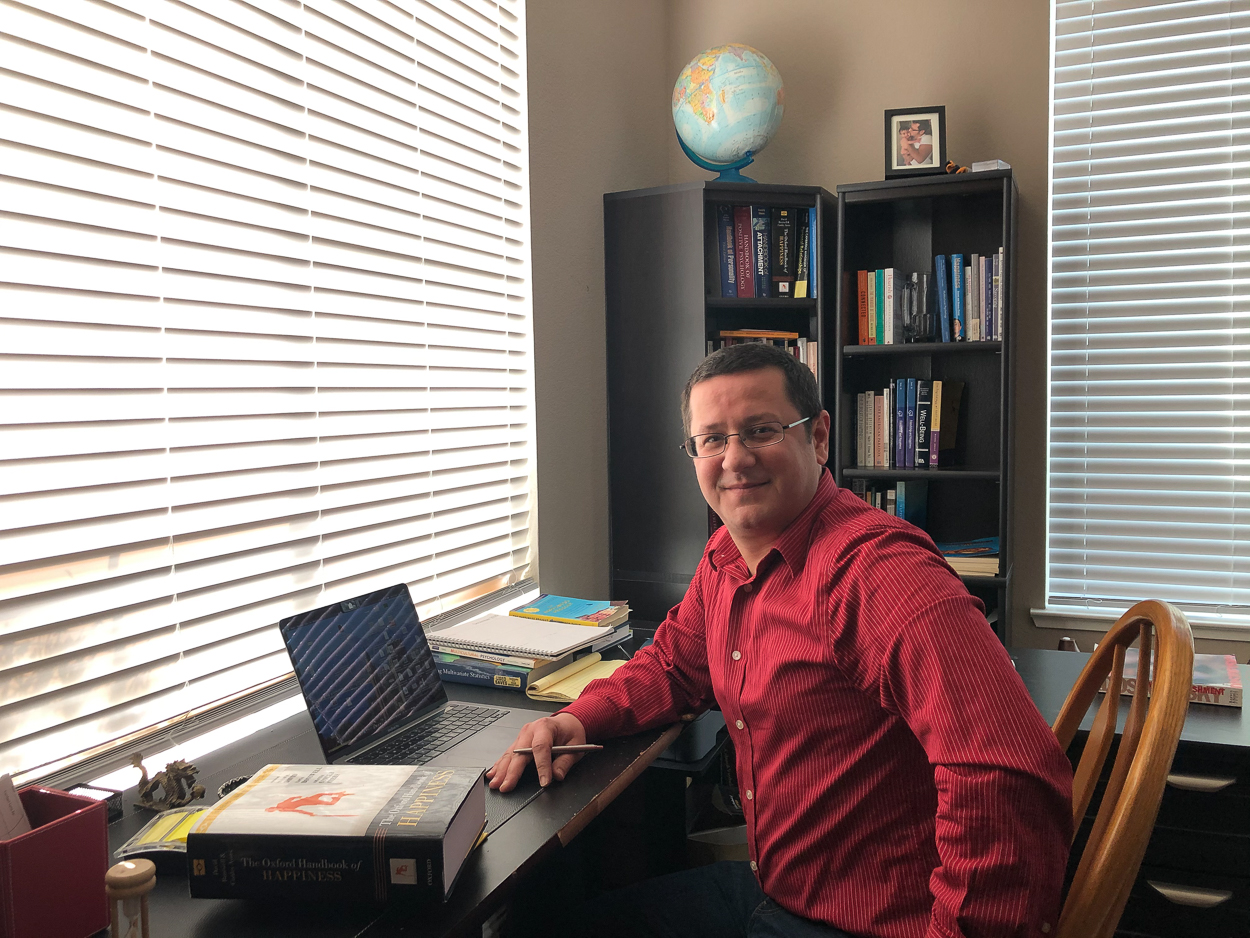Story Content
New happiness professor is teaching multiple ways to achieve that state of mind

February 15, 2021
Students in Sacramento State’s new Psychology of Happiness course will be thinking a lot this semester about the people, things, and circumstances that give them joy.
Their professor, Meliksah Demir, wants to teach them how to channel those feelings in an effort to live happier and more fulfilling lives.
Demir, one of the nation’s experts on the subject, is the University’s first Endowed Professor in Happiness. His students are learning about the history of happiness studies, how happiness is measured, its benefits, differences across cultures and nations, and how to become happier people.
“Try engaging in three or four small acts of kindness toward others. Then assess your happiness at the end of the day.”
Since his first year in college, in 1998 in Turkey, Demir has studied the science of happiness, part of the broader field of positive psychology. He has published multiple papers and edited two books on the topic.
Most recently, he was a professor of Psychological Sciences at Northern Arizona University in Flagstaff, where his research focused on the relationship between friendships and happiness.
His position at Sac State “is my dream job,” he said. “I’m absolutely delighted about it.”
Area businessman, entrepreneur and Hornet alumnus Rekhi Singh made a gift to the University to establish the professorship. The position is aimed at promoting happiness through academic research, curriculum development, partnerships across campus, and other activities.
Researchers define happiness as having satisfaction and meaning in life, the ability to feel positive emotions, the capacity to recover from negative emotions quickly, and holding a sense of purpose, according to the Greater Good Science Center at UC Berkeley. It does not necessarily come from having privilege or money, but rather from meaningful connections.
Scales measuring happiness consider, among other things, overall life satisfaction and the predominance of positive emotions over negative ones, Demir said. Research subjects listing things that make them happy often include relationships with family and friends, good health, and achieving work and personal goals, he said.
Genes play a strong role in the ability to find happiness, Demir said, although people can cultivate happiness by using certain tools regardless of genetics or personal circumstances.
“Increasing your happiness level is possible, but it requires intention, motivation and work,” Demir said.
Promoting happiness can be as simple as practicing meditation, keeping a “gratitude journal,” or engaging in “random acts of kindness,” he said.
Among Demir’s suggestions for improving happiness:
- “Try engaging in three or four small acts of kindness toward others,” such as allowing someone to stand ahead of you in line. “Then assess your happiness at the end of the day.” You’re likely to feel better, he said.
- Write down things for which you are grateful in a journal each day, or pen a “gratitude letter” to someone to “thank them in a meaningful way for what they have done for you. … Maybe, after the pandemic passes, you can read that letter to the person face to face.” People who engage in such disclosures report elevated levels of happiness, Demir said.
- Particularly during the pandemic, when people are more isolated, make a point of keeping in touch with friends and family members, and make plans. Practice “mindfulness,” or being in the moment, wherever you are and whatever you are doing. “If you’re looking at your Instagram feed while you’re hiking, you’re not going to enjoy that experience as much,” he said. “It takes away from the joy of the moment.”
Demir is teaching these techniques and more in his new course, which has attracted a full class of 32 students.
Ultimately, he wants to set up “happiness booths” on campus that members of the Sac State community can briefly visit and perhaps listen to music, sip some coffee, or contact a friend to boost their spirits.
Demir said he also would like to organize a “happiness conference” on campus, featuring experts and scholars from around the world.
Among other things, students in Demir’s course will be asked to practice happiness-promoting activities for one week and reflect on their state of mind before and after the exercise.
“I’ll be assessing the happiness of my students multiple times during the semester using established scales,” Demir said.
He hopes “their happiness will increase a little bit” thanks to the course material.
“I’d like to see that,” he said. “But even if that doesn’t happen, I’m confident that at least they’ll have the tools necessary to better cope with things in the future.”
Media Resources
Faculty/Staff Resources
Looking for a Faculty Expert?
Contact University Communications
(916) 217-8366
communications@csus.edu